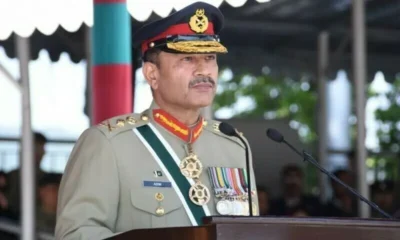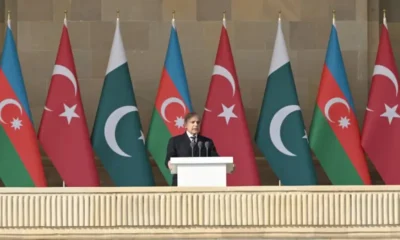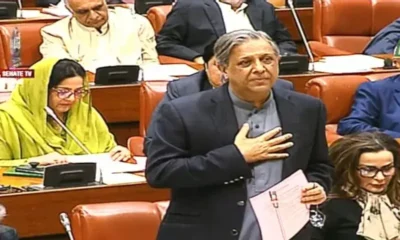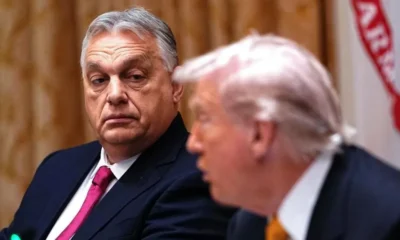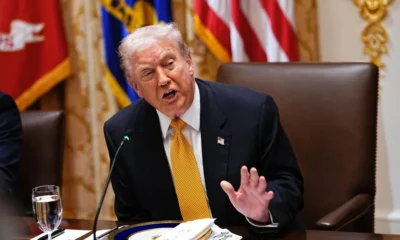Pakistan News
PTI’s Zafar warns against altering ‘balance’ of 1973 Constitution as Senate debates 27th Amendment

PTI Senator Ali Zafar detailed during a Senate session on Sunday five points that he said constituted the fundamental spirit of the 1973 Constitution and warned that altering the “balance of these five pillars” could lead to “major chaos”.
The session was convened today — on a Sunday in a rare move — with a one-point agenda to deliberate on the bill for the 27th Constitutional Amendment.
The 26-page Constitution (Twenty-Seventh Amendment) Act, 2025 was tabled in the Senate yesterday amid the opposition’s outcry over the pace and scope of the proposed changes, just hours after its approval by the federal cabinet.
Senate Chairperson Syed Yousaf Raza Gilani presided over the session today, which began with the House remembering Allama Iqbal on his birth anniversary. Later, the house also passed a resolution in relevance to Iqbal Day.
During the session, PTI lawmakers had pictures of their party founder Imran Khan placed on their desks. At the beginning of the proceedings, a PTI leader raised an objection, to which Gilani replied that as per his ruling yesterday, the senator could bring his concerns to the Senate chairman’s office.
‘You cannot force a Constitution through bullets’
Addressing the upper house of the parliament, PTI Senator Ali Zafar outlined “five points” that he said formed the basic spirit of the 1973 Constitution and were now being “punctured” in the proposed 27th Amendment.
The first, he said, was that Pakistan was a federation with autonomous provinces. Secondly, the elected parliament had authority but was bound to the Constitution. Zafar said the third point was the fundamental rights provided therein, with courts formed to protect and implement them.
Fourth pillar of the Constitution, he added, was an independent judiciary to protect people’s rights and guarantee democracy, while the fifth one was civilian supremacy.
“If you alter this balance of five pillars even slightly through any amendment, the entire Constitution will be shaken and can result in major chaos,” Zafar warned.
At one point, Senator Sarmad Ali objected to the PTI bringing framed pictures and placards, pointing out that it was against the Senate rules, at which Gilani requested the opposition to refrain from doing so.
After presenting his arguments against the proposed legislation, Zafar urged the House to reject the bill for it and invited the treasury benches for further discussions.
“We can sit and think. There are a lot of options how to reduce the pendency of cases. We are ready to talk with you to consider amendments that will benefit the people, but we will not tolerate that you harm the public,” the PTI leader said.
During his speech, Zafar stressed that the Constitution was a contract between the state and the public, with a “spirit of its own”. He added that the document was a pledge that everyone, regardless of the region they hailed from, would live according to the laws.
“When you make any change in the Constitution, it is equal to tampering with the foundation of a building, and if you make any mistake, the entire building can collapse,” he contended.
The PTI senator underscored the need for a consensus on making any changes to the Constitution, contending that consensus and a two-thirds majority were separate things. “You cannot force a Constitution through bullets.”
Arguing that the PTI represented millions of people and was rejecting the 27th Amendment, Zafar said, “Respect the mandate of the people and kindly do not vote for this amendment.”
The lawyer asserted that those bringing any constitutional amendment should be “genuinely elected”, with no personal motives or wishes to stay in power. “This parliament, in my opinion with due respect, is not authorised to pass these amendments,” he added.
Zafar also claimed that the proposed changes related to provincial shares and rights under the 18th Amendment, which were dropped in the current draft, were a “face-saving for the PPP” so certain originally intended amendments could be passed.
Pakistan News
One chief to rule all military services

The proposed 27th Constitutional Amendment, which would overhaul Article 243 and recast Pakistan’s military command hierarchy, is the most ambitious restructuring effort in decades and perhaps the most contentious as it collides with entrenched institutional cultures and the fragile equilibrium between civilian and military power.
Its implementation may prove far more difficult than its drafters imagine. The plan collides with entrenched institutional cultures, long-standing inter-service rivalries, and the delicate balance between civilian oversight and military autonomy that has, at least in theory, defined Pakistan’s power structure since 1973.
At the heart of the bill lies the deceptively simple premise of modernising defence coordination by creating a Chief of Defence Forces (CDF) and abolishing the office of the Chairman Joint Chiefs of Staff Committee (CJCSC).
But in practice, the reform would elevate the army chief to a constitutionally enshrined position of supremacy — combining operational command with overarching control of all services.
Article 243 overhaul marks a leap towards military centralisation and consolidation of uniformed supremacy
For over four decades, the CJCSC has served as the symbolic head of the armed services, designed to ensure coordination among the Army, Navy, and Air Force.
In practice, the role remained largely ceremonial, with the army — for over two and a half decades — reluctant to rotate it to other branches.
The proposed amendment would dissolve the post entirely on Nov 27, 2025, coinciding with the retirement of the current CJCSC, Gen Sahir Shamshad Mirza, and make the chief of army staff concurrently the Chief of Defence Forces — placing all three services under his authority.
Former human rights minister and defence academic Dr Shireen Mazari highlights an ambiguity left unaddressed in the bill.
“With the end of the CJCSC position, would the joint chiefs of staff committee also be dissolved?” she asks.
If so, which forum would replace it for coordination among the three services though the CJCSC’s ineffectiveness is well known.
The supporters of the legislation argue that the change will streamline decision-making and enhance unified command.
However, critics see it as institutional capture. “By placing an army officer as the Chief of Defence Forces with authority over the Air Force and Navy, the proposed system invites institutional imbalance and potential disaster,” warns retired Lt Gen Asif Yasin Malik, a former defence secretary.
“This amendment appears tailored to benefit a specific individual rather than to strengthen the defence structure,” he adds.
The criticism cuts to the core of the country’s military culture — the deep-seated rivalries among the Army, Air Force, and Navy, each guarding its operational turf and doctrine.
The Air Force and Navy have long resisted attempts to subordinate their autonomy under land-centric command.
Harmonising these distinct traditions — air power’s rapid, decentralised decision cycles versus the army’s hierarchical chain of command — has historically been the Achilles’ heel of every “joint” reform effort.
A critical question under the new system is who would control transfers, postings, and promotions in the Air Force and Navy.
Would the two service chiefs readily cede that authority? Dr Mazari cautions that if promotions in the Air Force and Navy were to be decided by an army-origin CDF, it “could lead to festering resentments and affect morale in the long run”.
She raises another hypothetical scenario: “What if there is a Marshal of the Air Force or Admiral of the Fleet while the COAS is a four-star general — will they then be under a four-star army officer if the latter is the CDF?” she asks. “Too much has been left to ad hoc and arbitrary decisions.”
Equally consequential is the proposal to create a Commander of the National Strategic Command, a position overseeing the country’s nuclear forces.
Under the amendment, the commander would be appointed by the prime minister on the army chief’s recommendation and must be chosen from within the army.
That subtle shift moves control of the country’s most sensitive assets away from the collegial National Command Authority (NCA), designed to ensure civilian oversight and inter-service balance, toward a single service.
Dr Mazari warns the change could have grave operational implications.
“Effectively, all nuclear weapons and delivery systems will be under the army’s control, including second-strike missiles which normally fall under naval command,” she says.
“This could lead to command-and-control problems and time delays, especially in a war-like situation.”
Her concerns recall a rare moment of institutional dissent — the 2019 National Security Committee meeting after the Balakot strikes — when, according to retired Lt Gen Malik, the then-army chief Gen Qamar Bajwa advised restraint but was reportedly overruled by the air chief and the CJCSC.
“Under the proposed arrangement, would such dissent, and the powerful response it ensured, even be possible?” he asks pointedly.
Perhaps the most controversial innovation lies in the clauses granting life-long constitutional protection to officers elevated to five-star ranks — field marshal, marshal of the air force, or admiral of the fleet.
These officers would “retain rank, privileges and remain in uniform for life”, removable only through impeachment under Article 47 and protected by immunities “similar to those enjoyed by the president” under Article 248, applied mutatis mutandis.
The language is designed to legalise the extraordinary promotion of Gen Asim Munir to field marshal following the India-Pakistan confrontation in May this year.
What looks ceremonial on paper, however, amounts to a permanent legal armour around an unelected officeholder — “a parallel authority insulated from the very rule of law it is sworn to defend”, as one constitutional lawyer puts it, asking not to be named.
Such provisions blur the line between honour and power.
“Even in the United States, the chairman of the joint chiefs does not wield absolute powers,” notes Lt Gen Malik.
“Creating lifetime immunities for military officers upends the very idea of civilian supremacy”. The supporters of the amendment, including government ministers, argue the changes merely formalise existing practices.
Yet the bill remains ambiguous about the tenure of the service chiefs.
Minister of State for Law and Justice Barrister Aqeel Malik told reporters that there was “no need for a fresh notification” on the army chief’s tenure, since existing legal provisions already establish a five-year term under the Army Act as amended by the 26th Constitutional Amendment.
But such reassurances overlook a deeper concern, which is that the proposed amendment will move the defence management from statute to constitutional entrenchment, making future civilian corrections exponentially harder.
Military affairs expert Muhammad Faisal, a doctoral researcher in Sydney, sees the bill as “the first phase” of a broader restructuring.
“There could be more updates coming with changes in the Army Act and NCA Acts to reflect new proposals,” he says.
“This could also lead to the restructuring of strategic forces, currently administered by three services separately, into a unified single command.”
That trajectory — toward centralisation rather than coordination — captures the tension at the heart of Pakistan’s military politics. Every attempt at “jointness” risks hardening into hierarchy because institutional habits and prestige are resistant to reform.
The stakes are profound. The country’s Constitution has endured repeated experiments in balancing military power and civilian authority.
A Chief of Defence Forces position can be created, as many democracies have done, through statutory reform subject to parliamentary review.
But embedding such a role in the Constitution transforms it from an administrative necessity into a permanent political reality, one that cannot easily be undone.
Ultimately, the question is not whether Pakistan needs a modernised defence structure. However, it definitely needs to be updated.
The question is whether modernisation must come at the cost of institutional equilibrium. History offers a cautionary note that once military power is constitutionalised, it rarely yields ground voluntarily.
Article 243 was meant to preserve civilian command over the armed forces. The 27th Amendment risks rewriting it into a charter of military supremacy.
Published in Dawn, November 9th, 2025
Header image: Chief of Army Staff Field Marshal General Asim Munir addressing the passing out parade of the Pakistan Military Academy in Khyber Pakhtunkhwa’s Kakul on April 29. — ISPR
Pakistan News
PM Shehbaz again thanks Trump for ‘bold and decisive leadership’ in brokering Pak-India ceasefire

Prime Minister Shehbaz Sharif on Saturday, once again, thanked the “bold and decisive leadership” of US President Donald Trump for brokering a ceasefire between Pakistan and India during the conflict between the two nuclear neighbours in May.
While addressing Azerbaijan’s Victory Day parade in Baku, the premier praised President Trump’s exemplary leadership, which led to the success of the peace efforts.
“It was President Trump’s, bold and decisive leadership, that brought about, the ceasefire, between Pakistan and India, restoring peace in South Asia — averting a major war, and saving millions of people.”
In his speech, the PM reiterated that Pakistan, “just like their Azerbaijani and Turkish brothers”, seeks peace, adding that no one can ever be allowed to challenge its sovereignty or undermine its territorial integrity.
The premier recalled that the Azerbaijani and Turkish military contingents had “proudly” marched alongside the Pakistani armed forces in Islamabad amid tremendous applause on August 14 this year, when they celebrated ‘Marka-i-Haq’ to commemorate their “historic victory” in the four-day war with India.
The Pakistan Army had named the period of conflict with India from the April 22 Pahalgam attack to the May 10 conclusion of Operation Bunyanum Marsoos as “Marka-i-Haq” in May.
PM Shehbaz highlighted how, five years ago, “the courageous sons of Azerbaijan, under the bold and visionary leadership of President Ilham Aliyev, rose to respond to the call of history”.
“The world witnessed in awe as Azerbaijan’s brave armed forces liberated their ancestral lands of majestic Karabakh,” the PM stated. “Throughout this entire struggle for liberation, Pakistan stood like a rock with its brotherly country Azerbaijan.”
According to PM Shehbaz, Azerbaijan’s victory in Karabakh was a “glorious vindication” of a just cause and a beacon of hope for all nations striving for sovereignty and self-determination, including the brave and resilient people of Gaza and Indian Illegally Occupied Jammu and Kashmir.
The prime minister arrived in Baku on Friday for a two-day official visit to Azerbaijan at Aliyev’s invitation and to attend the country’s Victory Day ceremony.
Referring to the recent flare up with the Afghan Taliban regime, the prime minister said that their common resolve for peace has most recently been tested in the case of Afghanistan and expressed gratitude to President Recep Tayyip Erdogan as well as to Emir of Qatar Sheikh Tamim bin Hamad Al Thani for their “invaluable contribution” in facilitating, the peace efforts, between Pakistan and Afghanistan.
“This is a true reflection of the strong and time-tested fraternal ties between our countries that stand together, through thick and thin,“ he opined.
Victory Day is observed to “commemorate the historic victory in the 44-day-long Karabakh Liberation War against Armenia”, according to the PM’s Office.
Pakistan News
Bill for 27th Constitutional Amendment tabled in Senate after federal cabinet’s approval

Shortly after getting approval from the federal cabinet, the bill for the 27th Constitutional Amendment was tabled before the Senate on Saturday and subsequently referred to the standing committees on law and justice.
A joint session of both the NA and Senate standing committees on law and justice was then summoned to discuss the amendment.
However, during the session of the standing committees, two Jamiat Ulema-i-Islam-Fazl (JUI-F) members, Aliya Kamran and Senator Kamran Murtaza, boycotted the meeting and said the proposed draft included amendments that were discarded in the 26th Amendment bill.
Following deliberations on the proposed amendment, the law committees of both Houses adjourned the moot till Sunday.
‘Discussions will continue till consensus is reached’
Law Minister Azam Nazeer Tarar, speaking to the media after the adjournment of the committees, said all parties were participating in the session and they had also “requested the opposition to participate”.
“Aliya Kamran had informed us that they have instructions from their party not to attend the session; however, all other parties were in attendance. We even asked the opposition to be a part of the session.”
Tarar said the “long-awaited” proposed amendment has been in discussion for the last 10-15 years. “Even today we are having a constructive debate on the matter.”
“At the time of the 18th Amendment, it was on the constitutional agenda, and even earlier, during the 26th Amendment, but due to certain reasons, one of which was Maulana Fazlur Rehman’s suggestion that such a major change should not be made and that it would be better to move towards transition and form constitutional benches,” said Tarar.
The law minister elaborated that the formation of the benches increased the workload of the judiciary, as the same judges were hearing cases fixed for the bench and otherwise.
“The objective was to ensure that the cases fixed in the Supreme Court are not delayed further and the common man gets relief.”
Tarar added that one of the aims of the proposed changes is also to do away with the criticism of a “court within a court”. “All members have reviewed it (proposed constitutional amendment) and we have completed arguments on around 60pc of the clauses.”
The law minister said a few questions have been raised by some members, clarifying that they are legal in nature and “not fundamental issues”.
“We will reconvene again tomorrow morning at 11am and continue our discussions. And till the time we do not reach a consensus, from all members of both Houses, the discussions will continue,” said the law minister.
The Senate and standing committee sessions will resume on Sunday, November 9.
Farooq H. Naek said no decision has been reached yet after deliberations on the proposed constitutional amendment, and claimed around 80pc of the bill was discussed.
He added that certain “mistakes” in the draft will be corrected and the law ministry has been made aware.
When asked about changes to Article 243, he said it was not discussed during today’s session.
Tarar tables bill in Senate
The bill, which was tabled in the Senate by the law minister, proposed the formation of a Federal Constitutional Court, changes in the process for appointing high court judges, changes to the threshold for provincial cabinets, and changes to the military leadership structure.
At the outset of the session, Tarar — who had earlier in the day briefed the media on some features of the proposed legislation after the federal cabinet meeting — requested the suspension of the question hour and other house business so he could brief lawmakers on the amendment.
The law minister then moved the bill before the upper house, with Chairman Yousuf Raza Gillani referring it to the National Assembly and Senate standing committees on law and justice for review and consideration. He said that both committees may hold joint meetings for a detailed review and consideration, and the report would be presented before the House.
-

 Europe News8 months ago
Europe News8 months agoChaos and unproven theories surround Tates’ release from Romania
-

 American News8 months ago
American News8 months agoTrump Expels Zelensky from the White House
-

 American News8 months ago
American News8 months agoTrump expands exemptions from Canada and Mexico tariffs
-

 American News8 months ago
American News8 months agoZelensky bruised but upbeat after diplomatic whirlwind
-

 Art & Culture8 months ago
Art & Culture8 months agoThe Indian film showing the bride’s ‘humiliation’ in arranged marriage
-

 Art & Culture8 months ago
Art & Culture8 months agoInternational Agriculture Exhibition held in Paris
-

 Politics8 months ago
Politics8 months agoUS cuts send South Africa’s HIV treatment ‘off a cliff’
-

 Politics8 months ago
Politics8 months agoWorst violence in Syria since Assad fall as dozens killed in clashes


